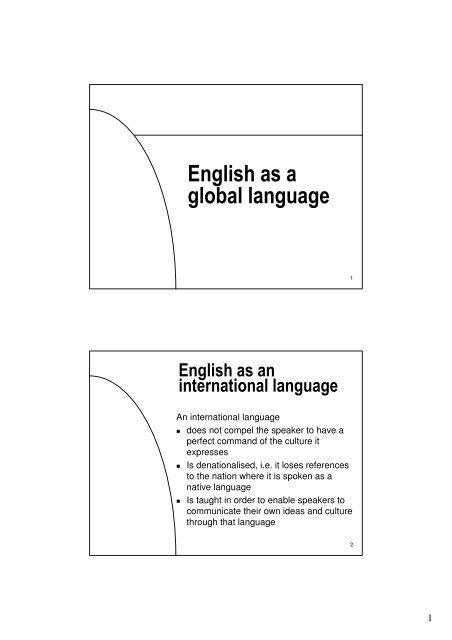English as a global language
English as a global language
English as a global language
Create successful ePaper yourself
Turn your PDF publications into a flip-book with our unique Google optimized e-Paper software.
<strong>English</strong> <strong>as</strong> a<strong>global</strong> <strong>language</strong>1<strong>English</strong> <strong>as</strong> aninternational <strong>language</strong>An international <strong>language</strong> does not compel the speaker to have aperfect command of the culture itexpresses Is denationalised, i.e. it loses referencesto the nation where it is spoken <strong>as</strong> anative <strong>language</strong> Is taught in order to enable speakers tocommunicate their own ide<strong>as</strong> and culturethrough that <strong>language</strong>21
<strong>English</strong> <strong>as</strong> aninternational <strong>language</strong>An international <strong>language</strong> functions<strong>as</strong> a bridge between speakers withdifferent linguistic backgroundswho wouldn’t otherwise understandeach other (lingua franca).Nowadays <strong>English</strong> plays the role oflingua franca that once belonged toFrench in Southern Europe andGerman in Northern Europe.3Why <strong>English</strong>?NOT because of structuralqualities:morphosyntax may be e<strong>as</strong>ier ifcompared to that of otherEuropean <strong>language</strong>s, BUTphonetics and some verbalfeatures are actually extremelydifficult42
Why <strong>English</strong>?Great Britain’s military andindustrial expansion (18th-early20th cent.)Political expansion by the UK andthe US (esp. In the 19th cent.)Economic, cultural and technologicexpansion (second half of the 20thcent.)5Why <strong>English</strong>?For colonial re<strong>as</strong>ons: diffusionthrough political control overcolonised countries (19th-20thcent., esp. Asia and Africa)population growth: migration andsettlement of native speakers fromGB, esp. In America and AustraliaEconomic and cultural growth:central role played esp. by the US63
What kind of <strong>English</strong>?<strong>English</strong> <strong>as</strong> a Native Language (ENL):strong British settlement (e.g. USA,Australia)<strong>English</strong> <strong>as</strong> a Second Language (ESL):multilingual countries using <strong>English</strong> bothfor internal and external re<strong>as</strong>ons (e.g.India, Nigeria)<strong>English</strong> <strong>as</strong> a Foreign Language (EFL):countries having a pan-national<strong>language</strong> (e.g. China, Egypt)7Re<strong>as</strong>ons for successMedia: press, TV, radio, cinema, music,InternetTravelling and international transport:signs in <strong>English</strong> all around the worldInternational security (Se<strong>as</strong>peak,Airspeak)Education and research (conferences,taught courses at universities)International politics84
<strong>English</strong> spreading today<strong>English</strong> is spreading along two lines:a geographical linea contextual/sectorial line9Geographical line:divergenceGeographical variation may causedeviation from models and givebirth to new varietiesNew varieties may be lesscomprehensible to speakers of the“original” <strong>language</strong>s and ofvarieties located elsewhereIdentity in former colonies105
Sectorial-contextual lineCommunications prevent <strong>English</strong>from fracture but do not contributeto convergence<strong>English</strong> <strong>as</strong> a special<strong>language</strong>/<strong>English</strong> for SpecificPurposes/EST=<strong>English</strong> for Scienceand Technology is a unifying factorbecause it avoids ambiguity andtherefore protects <strong>English</strong> againstvariation11Traditional Models Standard British <strong>English</strong> (SBE),BBC <strong>English</strong>[Received Pronunciation (RP),Estuary <strong>English</strong>] General American (GenAm)126
















